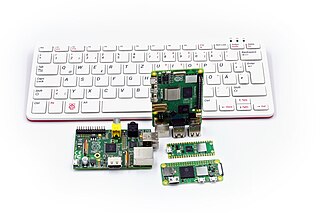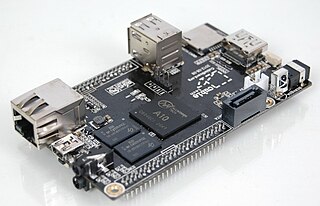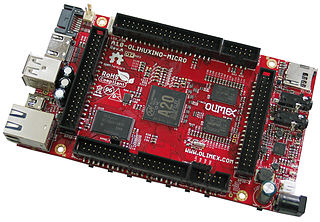Rockchip is a Chinese fabless semiconductor company based in Fuzhou, Fujian province. Rockchip has been providing SoC products for tablets & PCs, streaming media TV boxes, AI audio & vision, IoT hardware since founded in 2001. It has offices in Shanghai, Beijing, Shenzhen, Hangzhou and Hong Kong. It designs system on a chip (SoC) products, using the ARM architecture licensed from ARM Holdings for the majority of its projects.

Raspberry Pi is a series of small single-board computers (SBCs) developed in the United Kingdom by the Raspberry Pi Foundation in association with Broadcom. Since 2013, Raspberry Pi devices have been developed and supported by a subsidiary of the Raspberry Pi Foundation, now named Raspberry Pi Ltd. The Raspberry Pi project originally leaned toward the promotion of teaching basic computer science in schools. The original model became more popular than anticipated, selling outside its target market for diverse uses such as robotics, home and industrial automation, and by computer and electronic hobbyists, because of its low cost, modularity, open design, and its adoption of the HDMI and USB standards.

The Allwinner A1X is a family of single-core SoC devices designed by Allwinner Technology from Zhuhai, China. Currently the family consists of the A10, A13, A10s and A12. The SoCs incorporate the ARM Cortex-A8 as their main processor and the Mali 400 as the GPU.
The MK802 is a PC-on-a-stick produced by Rikomagic, a Chinese company using mostly two series of systems on a chip architectures:

A stick PC or PC on a stick is a single-board computer in a small elongated casing resembling a stick, that can usually be plugged directly into an HDMI video port. A stick PC is a device which has independent CPUs or processing chips and which does not rely on another computer. It should not be confused with passive storage devices such as thumb drives.

Cubieboard is a single-board computer, made in Zhuhai, Guangdong, China. The first short run of prototype boards were sold internationally in September 2012, and the production version started to be sold in October 2012. It can run Android 4 ICS, Ubuntu 12.04 desktop, Fedora 19 ARM Remix desktop, Armbian, Arch Linux ARM, a Debian-based Cubian distribution, FreeBSD, or OpenBSD.

Allwinner Technology Co., Ltd is a fabless semiconductor company that designs mixed-signal systems on a chip (SoC). The company is headquartered in Zhuhai, Guangdong, China. It has a sales and technical support office in Shenzhen, Guangdong, and logistics operations in Hong Kong.

OLinuXino is an open hardware single-board computer capable of running Android or Linux designed by OLIMEX Ltd in Bulgaria.

The ARM Cortex-A53 is one of the first two central processing units implementing the ARMv8-A 64-bit instruction set designed by ARM Holdings' Cambridge design centre, along with the Cortex-A57. The Cortex-A53 is a 2-wide decode superscalar processor, capable of dual-issuing some instructions. It was announced October 30, 2012 and is marketed by ARM as either a stand-alone, more energy-efficient alternative to the more powerful Cortex-A57 microarchitecture, or to be used alongside a more powerful microarchitecture in a big.LITTLE configuration. It is available as an IP core to licensees, like other ARM intellectual property and processor designs.

Banana Pi is a line of single-board computers produced by the Chinese company Shenzhen SINOVOIP Company, its spin-off Guangdong BiPai Technology Company, and supported by Hon Hai Technology (Foxconn). Its hardware design was influenced by the Raspberry Pi, and both lines use the same 40-pin I/O connector.

Amlogic Inc. is a Fabless semiconductor company that was founded on March 14, 1995, in Santa Clara, California and is predominantly focused on designing and selling system on a chip integrated circuits. Like most Fabless companies in the industry, the company outsources the actual manufacturing of its chips to third-party independent chip manufacturers such as TSMC. Its main target applications as of 2021 are entertainment devices such as Android TV-based devices and IPTV/OTT set-top boxes, media dongles, smart TVs and tablets. It has offices in Shanghai, Shenzhen, Beijing, Xi'an, Chengdu, Hefei, Nanjing, Qingdao, Taipei, Hong Kong, Seoul, Mumbai, London, Munich, Indianapolis, Milan, Novi Sad and Santa Clara, California.

The Rockchip RK3288 is an ARM architecture System on Chip (SoC) from Rockchip. It is the first SoC, in August 2014, that uses the 32-bit ARM Cortex-A17 processor. It is a quad-core processor with a NEON coprocessor and hardware acceleration for video and 3D graphics. It is used in a number of Chromebooks and other low-power, low-performance devices.

SolidRun is an Israeli company producing embedded systems components, mainly mini computers, Single-board computers and computer-on-module devices. It is specially known for the CuBox family of mini-computers, and for producing motherboards and processing components such as the HummingBoard motherboard.
CHIP was a single-board computer crowdfunded by now-defunct Next Thing Co. (NTC), released as open-source hardware running open-source software. It was advertised as "the world's first $9 computer". CHIP and related products are discontinued. NTC has since gone insolvent.

The Pinebook is a low-cost notebook developed by Hong Kong-based computer manufacturer Pine64. The Pinebook was announced in November 2016 and production started in April 2017. It is based on the platform of Pine64's existing Pine A64 single board computer, costing US$89 or US$99 for the 11.6" and 14" model respectively. Its appearance resembles the MacBook Air. The Pinebook is sold "at-cost" by Pine64 as a community service.
The Libre Computer Project is an effort initiated by Shenzhen Libre Technology Co., Ltd., with the goal of producing standards-compliant single-board computers (SBC) and upstream software stack to power them.

The Raspberry Pi 4 is the 4th generation of the mainline series of Raspberry Pi single-board computers. Developed by Raspberry Pi Trading and released on 24 June 2019, the Pi 4 came with many improvements over its predecessor; the SoC was upgraded to the Broadcom BCM2711, two of the Raspberry Pi's four USB ports were upgraded to USB 3.0, and options were added for RAM capacities larger than the 1 GB standard for the preceding Raspberry Pi 3 series. The Pi 4 also ends the trend of the $35 maximum MSRP that previous Raspberry Pis had adhered to, as the larger RAM capacities added extra cost to the board; however, the base 1 GB model is still sold for $35. On 28 September 2023, the Raspberry Pi 5 was announced as the successor to the Raspberry Pi 4.

The PinePhone is a smartphone developed by Hong Kong-based computer manufacturer Pine64, intended to allow the user to have full control over the device. Measures to ensure this are: running mainline Linux-based mobile operating systems, assembling the phone with screws, and simplifying the disassembly for repairs and upgrades. LTE, GPS, Wi-Fi, Bluetooth and both cameras can be physically switched off. The PinePhone ships with the Manjaro Linux operating system using the Plasma Mobile graphic interface, although other distributions can be installed by users.

The PineTab is a low-cost tablet developed by Hong Kong-based computer manufacturer Pine64. The PineTab was announced in May 2020, with shipping beginning in September 2020. It is based on the platform of the existing Pine A64 single board computer, with the platform being used in related devices, such as the Pinebook and PinePhone.
















